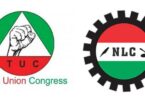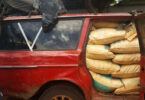
This is not the best of times for Nigerians, particularly the ordinary man on the street- the low class citizens as some people would prefer to call them.
This is because bread, which used to be the easiest and cheapest available food for the poor, is no longer within their reach.
Prices of food items have continued to be on an upward spiral for some time now, with its attendant negative effects on the masses.
Many are dying of hunger, while so many others are suffering from one kind of ailment or the other, due to malnutrition. The level of inflation is frightening and it has virtually affected the price of everything, including food items.
The country’s currency, the Naira, keeps plummeting in the international market, thereby worsening the economic woes of many Nigerian households.
Just a few days ago, protests broke out in Niger and Kano States over high cost of living.
Unfortunately, the government has been unable to find a solution to the situation, particularly to the consistent rise in the price of wheat flour, the raw material for bread. The situation has become a big source of worry to both bread bakers and consumers.
The development has become so unbearable that only on Friday, February 2, local bread bakers in Kano State, Northwest Nigeria, took to the street to protest the high cost of flour, saying that the price hike was threatening to force them out of business
The bakers lamented that they used to buy a bag of flour for N16,000, but now, the same bag is sold for N43,000 and they cannot afford it.
At the forefront of the protest was the chairperson of the association, Fatima Awwal, who called on the Federal Government to, as a matter of urgency, look into the incessant increment in price of the commodity.
She further noted that many of them would definitely be forced out of business if the government failed to act and fast too.
She said: “We are out here on the streets protesting to let the leaders know the economic hardship that we are facing at the moment.
“This is our small scale business facing deterioration due to the high rise in the price of flour. It is a business for the poor, which the rich cannot dare to venture into.
“We are in a very difficult situation, and we need help. This is a small-scale industry, mostly run by women. Many have lost their capital.
“It is such that only 25 percent of us are now remaining in the business, as many others have closed down due to lack of capital.
“We used to buy a bag of floor for N16,000 in the past, but now it sells for N43,000. This is absurd. What we produce is a common food for the poor, and it is now becoming unaffordable. Anytime we go to buy flour, we get an increase of between N1,500 and N2,000.
“We are calling on the authorities and those concerned to look into this matter, because we are running out of business, and it is affecting our families.
“Majority of us are widows, and this is what we do to cater for our families. Life is becoming more difficult, we can hardly feed or send our children to school due to this hardship.
“Currently, we use the IRS flour produced by Abdussamad; it is the best for our products, but we cannot afford it any longer. If nothing is done, we have no choice, but to close down, and this will affect the public.
“We cannot engage in any act that is not in tandem with the religion of Islam, hence, the need for governments at all levels to wade into this high price of flour by engaging those companies producing flour on the need to bring the price down.
“We call on the government to find positive ways to assist those flour companies, to source for foreign exchange, so that the cost of production would be favourable to them.”
Generally, in the north, Gurasa is a kind of local bread produced, using a combination of flour, yeast, sugar and water.
It is a local staple for many people, particularly the downtrodden. It provides job opportunities to many because it is sold almost in every nook and cranny, including the market places, motor parks and road sides.
The protesters carried placards bearing such inscriptions as, ‘Inflation is too high in the country,’ ‘We are not in support of the hike in flour price,’ ‘FG must act now, we are tired of increment of flour price,’ ‘Look into flour price hikes,’ ‘Nigerians are hungry’ and ‘Gurasa is the only staple food for the poor,’ among others.
However, while some people blame the development on the fuel subsidy removal, which they argued had affected virtually prices of everything, including transport, others blame it on the continued fall of the Naira against the dollar.
Those pushing the fuel subsidy removal argument are insisting that the policy raised the prices of fuel and diesel by more than 400 percent, and this has correspondingly moved the cost of transport to the rooftop.
“The fuel subsidy removal is the worst policy of this government. It has created hunger, starvation, and even death, in some extreme cases.
“It has affected the bread bakers very adversely to the extent that many of them have closed shops. They spend so much to transport the flour from the place of purchase to the factory, and to the point of distribution, and at the end of the day, all those extra expenses are factored into the cost of production, thereby pushing the price of bread beyond the reach of the common man,” a bread baker, Kolade Folurunsho told DAILY POST.











Leave a Comment